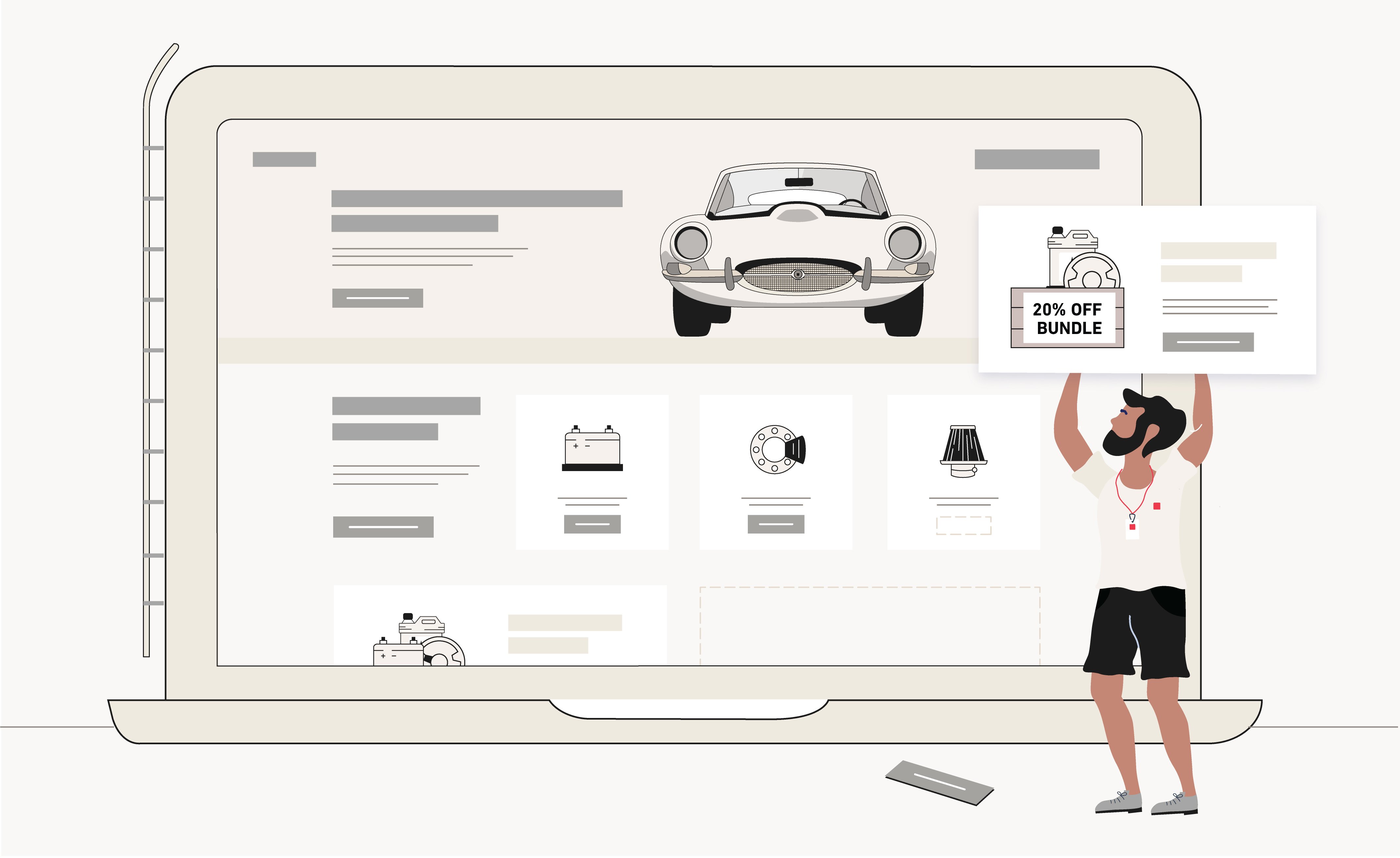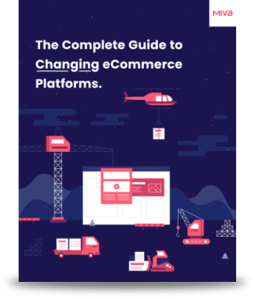
See why top ecommerce brands use Miva’s no-code platform to run
multiple stores, manage massive catalogs, and grow their revenue.
As demand continues to grow online, more merchants are looking to expand their digital presence and innovate their sites for modern shoppers. A key part of investing in ecommerce is selecting the right ecommerce platform. A platform’s capabilities impact every aspect of how you sell online, from how you manage orders and display products to how you scale your business and adapt to the current times.
Looking to set up an online store but not sure which platform to invest in? From open source to cloud-based software, this guide will introduce you to the best types of ecommerce platforms and how to decide on the most suitable one for your business.
Put simply, an ecommerce platform is the transactional infrastructure for your online store. While a basic website might display products, the addition of an ecommerce platform allows customers to select an item and conduct the financial transaction that completes the sale. More complex ecommerce platforms provide sophisticated merchandising tools and targeted promotions, as well as ways to track and synch inventory. Platforms can also integrate with accounting and CRM software and shipping services.
Open source platforms are based on code that has been made freely available. Inexpensive and easily customizable, they are a popular option for small businesses. Marketplaces offer thousands of plugins and themes. Open source platforms are good for businesses who want to have developers on staff, or when the company wants to commit external developer resources.
SaaS has a variety of benefits when it comes to security and stability. You won’t have to worry when new security patches come out, or that an upgrade to one part of your system will clash with another. A SaaS platform is great for businesses who want robust functionality without the expense of having a team of developers.
Headless ecommerce is an ecommerce solution that separates the front end and back end of a website. The separation of the two ends allows developers to freely customize the customer-facing side of a website without being tied to the architecture of the back end. Headless ecommerce appeals to businesses looking for specific functionality and control over their online experience that they can’t get from an all-in-one solution.
All open source platforms operate independently from hosting for the online store, so you can choose your provider and, theoretically, move if you outgrow your hosting service or find a better deal. Some companies own and manage their own servers for on-premise hosting, while others turn to third parties with competitive pricing. While the hosting may be cheaper on a third-party site, this option is likely to involve more time for set up and to maintain the site, particularly if you decide to move between hosts. It’s also likely to take longer to fix problems if there is finger pointing between the providers, with the platform blaming the hosting company and the hosting company blaming the platform.
Ecommerce platforms that include hosting enable you to get things up and running quickly, with quick scalability when you need it. These companies are pre-optimized hosting for ecommerce businesses, as opposed third-party hosts who serve a variety of online business such as video libraries, for example. Managed hosted environments also offer more stability than small hosting companies can offer. Look for details about the platform’s redundant infrastructure, network core, and connectivity to make sure your store stays open even with high traffic. Note: your hosting charges will likely increase as your business grows, but with a highly secure, stable, and scalable system you are less likely to have downtime that will hurt sales. You’ll also have a single person to call if you have a problem, making issues easier to identify and faster to fix.
Your business needs an ecommerce platform because it enables you to market and sell your products. Unless you’re selling only on a marketplace such as Amazon, eBay or Etsy, you’ll need a way to display your products, so customers can see them. Unless you’re expecting customers to send in old fashioned checks by snail mail or go through PayPal, you’ll need a way to process credit card transactions. If you want to sell products directly to customers, you’ll need an ecommerce platform. Having an ecommerce platform also provides a variety of other benefits, including building your brand, developing a long-term relationship with your customers, and managing operations such as inventory and shipping.
The best ecommerce platform for your business depends upon a variety of factors. How hands-on do you want to be with the technology? How many services do you want to be integrated into the platform? How many SKUs do you expect to offer?
When comparing ecommerce platform features and software packages, these can vary on each ecommerce platform so it’s important to consider which are most important to you.
Look for these core components of ecommerce that are key to building sales on your online store:
Finally, as you shop for an ecommerce platform don’t forget to run these by your IT department. These are the main issues they are likely to care about.
Ready to start evaluating specific ecommerce platforms? The right solution for your business will depend on the size of your business, your industry, and the complexity of your products and fulfillment process.
Shopify Plus – Shopify is mainly oriented towards small business, with less developed functionality for larger enterprise merchants. While it is a major player in this space, B2B channel options are limited on Shopify Plus and adding one requires sub-domains. Out-of-the-box functionality on Shopify is restricted by plan type. The user interface relies on expensive third-party apps and developers for heavy lifting.
BigCommerce – BigCommerce’s built-in features are limited, and access to Faceted Search, Dedicated SSL and API access is restricted by your plan. There are significant issues with account access and site personalization, and catalog modifications are rudimentary. Performance is hampered by plugins and patches, which slows page speeds. There is also no native credit card wallet solution.
Miva – Miva allows you to manage B2B, B2C, and DTC channels on the same site, with native support for merchandising, inventory, and checkout. The SaaS-hosted and managed system offers easy upgrades, scalable processors, and super-fast page load speeds. Site security includes built-in PCI compliance and patch free protection. Payment options include a native credit card wallet along with major payment gateways. Miva also provides 24/7/365 in-house tech support.
Magento – Custom site design on Magento is done in open source code, with extensions required for basic ecommerce functionality. Open-source platforms require additional plugins and patches, which drain CPU resources and result in slow-loading pages. Magento upgrades are often known to break stores, and soft security on the platform can expose a website to hacks and data breaches. Payment transaction failures and checkout issues require lots of patching.
Salesforce Commerce Cloud — Formerly Demandware, this platform extends CRM, marketing, and customer service capabilities to Salesforce merchants along the full infrastructure and unified functions of an ecommerce site. Although it’s often considered by enterprise-level businesses and high fashion retailers, Demandware can be costly, difficult to manage, monolithic, and slow to scale for the majority of online merchants, leading to a much higher total cost of ownership in the long term.

Yes, but, they usually aren’t actually free. You’ll need to pay for hosting. You’re likely to need to pay for some custom development. You’re likely going to need to pay for some plugins. The truth is, “free” platforms can end up being more expensive than paid platforms. (Watch this webinar for more information.)
If you’re keeping it simple, you might be able to do it on your own. Each ecommerce platform is different in the language they use, but most are built in such a way that someone who is somewhat tech savvy can put together a website. But you’re likely to want extra technical help at some point. Therefore, it would be wise to evaluate your options for development support when choosing a platform – even if you don’t need a developer right away. Look for in-house Professional Services and third-party agency partners that can help you grow.
A payment gateway is the online equivalent of a credit card swiper that you use in a retail store. Payment gateways shouldn’t impact your choice of an ecommerce platform. Braintree and Square make it super easy to start processing payments. Authorize.net gives you the flexibility to work with nearly any merchant services company.
Find out how your online store can benefit from a move to the Miva platform. Book a time with a Miva Solutions architect today.

Elisa Williams is a journalist and communications strategist who combines storytelling with solid research and analysis. A contributing author to the Miva Blog, Elisa has written for a wide array of consumer, business and technology publications, including Newsweek, Real Simple, Computer Life and Inc. Her marketing and content development work includes supporting technology companies that specialize in ecommerce, financial services and big data.
Love it? Share it!
No worries, download the PDF version now and enjoy your reading later...
Download PDF Miva
Miva
Miva offers a flexible and adaptable ecommerce platform that evolves with businesses and allows them to drive sales, maximize average order value, cut overhead costs, and increase revenue. Miva has been helping businesses realize their ecommerce potential for over 20 years and empowering retail, wholesale, and direct-to-consumer sellers across all industries to transform their business through ecommerce.
Visit Website